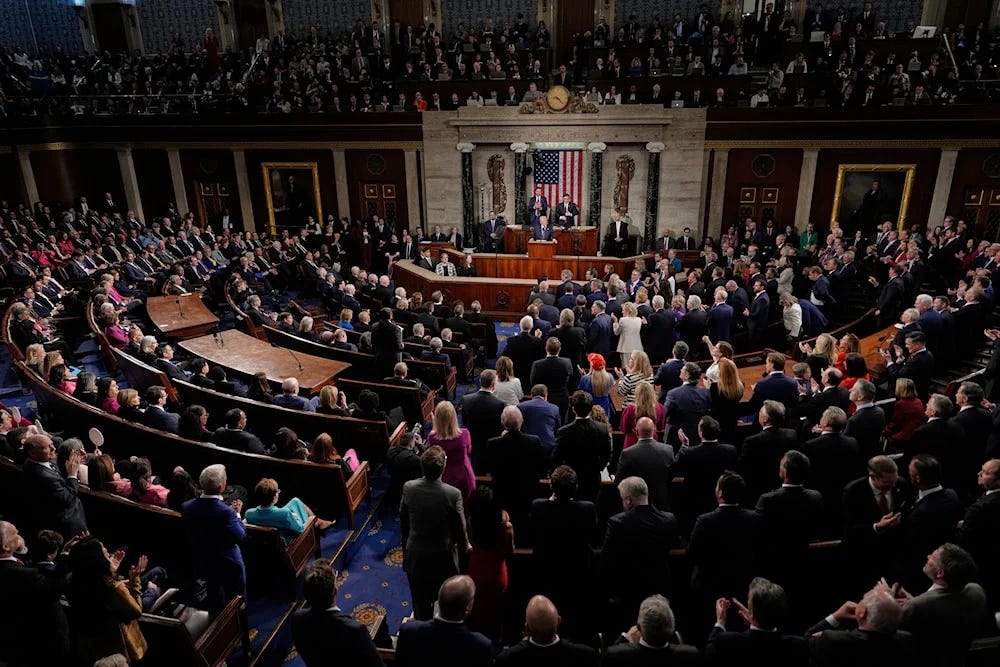Congress Moves to Block Trump from Launching War on Iran Without Authorization
Bipartisan lawmakers sound alarm as Trump fuels fears of direct U.S. military involvement in Israeli-led war
United States, PUREWILAYAH.COM - As U.S. President Donald Trump edges the country closer to direct military confrontation with Iran, a bipartisan group in Congress is moving to block him from doing so without formal authorization, according to The Intercept.
On Tuesday, Representatives Thomas Massie and Ro Khanna introduced a War Powers Resolution aimed at barring the United States Armed Forces from engaging in hostilities against the Islamic Republic of Iran without approval from Congress.
The move mirrors similar legislation introduced in the Senate a day earlier by Senator Tim Kaine, amid growing alarm over the Israeli occupation’s attacks on Iran, Tehran’s retaliation, and Trump’s escalating rhetoric against Iran’s leadership.
“The United States must not get dragged into another war in the Middle East without a full debate and vote in Congress,” Rep. Khanna told The Intercept, calling the potential for unauthorized involvement in Israel’s war on Iran “a red line.”
Khanna emphasized the need for a diplomatic resolution to the conflict and sharply criticized Trump for circumventing established constitutional processes.
War Powers Resolution and Executive Overreach
The War Powers Resolution of 1973 was designed to limit the president’s ability to deploy U.S. forces into conflict zones without Congressional consent. However, successive administrations have found ways to sidestep its restrictions.
Representative Massie noted that the House version of the resolution is “privileged,” meaning it could be brought to the floor for debate and a vote within 15 days, as per The Intercept.
This legislative push signals deepening concerns in Washington over unilateral military decisions, especially in the context of an intensifying conflict with a major regional power like Iran.
Rising Fears Over U.S. Involvement in Israeli Strikes
The Congressional effort comes amid heightened fears over a broader regional war as Israel has launched airstrikes targeting Iranian nuclear and military infrastructure. Iran has retaliated, and the situation remains volatile.
Trump has inflamed these fears with a series of provocative statements on his social media platform, taunting Iranian leaders and calling for their “unconditional surrender.”
“We now have complete and total control of the skies over Iran,” Trump wrote, boasting about U.S. military superiority.
In another post, he claimed knowledge of the Iranian Leader’s location and implied he was a viable target, though he stopped short of authorizing a strike — “for now.”
According to The Intercept, these threats were followed by reports that Trump had discussed the possibility of joining Israeli strikes on Iran’s nuclear facilities during a recent meeting in the White House situation room. While no official decision has been announced, the prospect of U.S. involvement has shaken Capitol Hill.
Rep. Khanna recently pressed Defense Secretary Pete Hegseth for clarity on whether the U.S. would allow itself to be drawn into a regional conflict by the Israeli occupation. Hegseth reportedly declined to give such assurances.
Trump himself refused to address the issue while departing from the G7 Summit in Canada, telling reporters:
“I don’t want to talk about that.”
Lawmakers Divided: Calls for Restraint vs. Calls for Strikes
The brewing crisis has exposed deep divisions in Congress.
Congresswoman Summer Lee condemned Trump’s maneuvering, accusing him of using Israel’s war on Iran as a pretext for executive overreach.
“Millions have paid the price. We cannot allow Trump, or anyone, to use someone else’s war for political gain,” Lee said, referencing the U.S. invasions of Iraq and Afghanistan as cautionary lessons.
However, not all lawmakers share this concern. Senator John Fetterman, also from Pennsylvania, dismissed Kaine’s Senate resolution and expressed support for U.S. military strikes on Iran.
“I’m going to vote it down,” Fetterman told Fox News.
“I really hope the president finally does bomb and destroy the Iranians.”
His comments marked a sharp departure from his earlier position in 2022, when he criticized Trump for abandoning diplomacy with Iran.
Anti-War Activists Sound the Alarm
Anti-war organizations and analysts are voicing grave concerns about the consequences of potential U.S. intervention.
Samer Araabi, from the Arab Resource and Organizing Center, told The Intercept that the prospect of a U.S. strike on Iran was “horrifying,” warning that the aftermath could be even more destabilizing than the Iraq invasion, given Iran’s population size and military strength.
Clare Bayard, of the Center for Political Education, echoed these fears:
“We have to challenge this country’s tendency toward amnesia,” she said, referencing the false pretexts used in the 2003 Iraq War.
“This push for war with Iran follows the same playbook.”
Source: Al-Mayadeen


